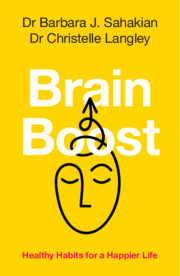Book contents
- Reviews
- Brain Boost
- Brain Boost
- Copyright page
- Dedication
- Contents
- Foreword
- Introduction
- 1 The Importance of Exercise
- 2 Eating for Health and Wellbeing
- 3 Why Do We Need Sleep?
- 4 Why Is Social Interaction So Important?
- 5 Social Kindness and Helping Others
- 6 Mindfulness and Enjoying the Moment
- 7 Keeping Your Brain Fit through Learning
- 8 Don’ts: What Not to Do
- 9 Experience the Benefits of Work
- 10 Now It’s Your Time to Boost Your Brain
- Acknowledgements
- References
- Index
4 - Why Is Social Interaction So Important?
Published online by Cambridge University Press: 23 January 2025
- Reviews
- Brain Boost
- Brain Boost
- Copyright page
- Dedication
- Contents
- Foreword
- Introduction
- 1 The Importance of Exercise
- 2 Eating for Health and Wellbeing
- 3 Why Do We Need Sleep?
- 4 Why Is Social Interaction So Important?
- 5 Social Kindness and Helping Others
- 6 Mindfulness and Enjoying the Moment
- 7 Keeping Your Brain Fit through Learning
- 8 Don’ts: What Not to Do
- 9 Experience the Benefits of Work
- 10 Now It’s Your Time to Boost Your Brain
- Acknowledgements
- References
- Index
Summary
Social interaction with friends and family is pivotal for our cognitive development, mental health, and overall wellbeing. These connections shape our understanding of ourselves, others, and the world around us. Research consistently highlights the positive impact of social engagement on cognition and mental health, from stimulating problem-solving skills to combating loneliness and reducing stress. The brain regions activated during social interactions underscore the significance of social cognition, empathy, and emotional processing. Particularly during adolescence, positive friendships play a crucial role in emotional resilience and healthy development. Studies suggest an optimal number of close friends for mental health benefits, emphasizing quality over quantity in social relationships. Social support networks bolster resilience and aid in recovery from mental health disorders. Conversely, social isolation poses risks to brain health and mental wellbeing, highlighting the importance of maintaining social connections throughout life. Engaging in social activities, whether through clubs, volunteering, or hobbies, fosters social interaction and enhances overall wellbeing. In a world increasingly driven by technology, prioritizing face-to-face social interaction remains essential for brain health, cognition, and mental wellbeing.
- Type
- Chapter
- Information
- Brain BoostHealthy Habits for a Happier Life, pp. 47 - 56Publisher: Cambridge University PressPrint publication year: 2025

